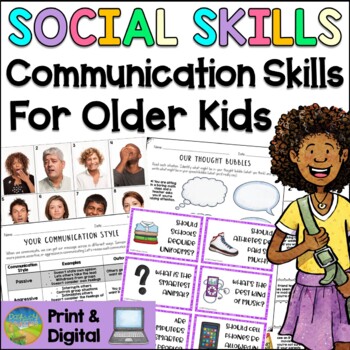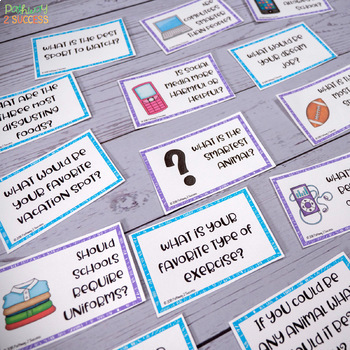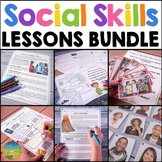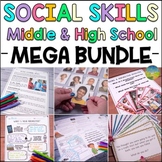Social Skills Lessons for Communication Skills - Conversations, Listening & More
- Zip
- Google Apps™

What educators are saying
Also included in
- Use these lessons to teach social skills to older learners. Units teach about basic interactions, managing emotions, conversations, empathy, and perspective-taking. Just some of the lessons target being respectful, following directions, accepting criticism, working with others, understanding emotionPrice $51.20Original Price $80.00Save $28.80
- Use these lessons and activities to teach critical social skills to older learners. Units and activities teach about basic interactions, managing emotions, conversations, empathy, and perspective-taking. Just some of the lessons and activities target being respectful, following directions, acceptingPrice $76.00Original Price $131.00Save $55.00
Description
Use these lessons to teach critical social skills of communication and conversations to older kids, including understanding starting conversations, nonverbal cues, active listening, thinking before speaking, taking turns, staying on topic, cell phone manners, and more. This resource includes 10 core lessons, each with several activities for extended practice. A total of 52 activities are included! The entire unit focuses on how to help kids and young adults learn strong communication and conversation skills.
Digital Version
I've added a digital version for each lesson using Google Drive. You can access the entire unit (student pages only) and each individual lesson using Google Drive. Please note that educator plans are included separately.
Table of Contents
Introduction Materials
• Educator Guide
• Pre-Assessment
Lesson 1 Developing Communication Skills
• Activity 1: Our Communication Skills
• Activity 2: How Communication Skills Help Us
• Activity 3: Benefits of Communication
• Activity 4: Communicating With Others
Lesson 2 Nonverbal Communication
• Activity 1: Understanding Nonverbal Cues
• Activity 2: Body Language
• Activity 3: Body Language Task Cards
• Activity 4: Facial Expressions
• Activity 5: Facial Expressions Cards
• Activity 6: Tone and Volume
• Activity 7: Say It Cards
Lesson 3 Thinking Before You Speak
• Activity 1: How Our Words Impact Others
• Activity 2: Thinking of Others
• Activity 3: Using Self-Control
• Activity 4: Our Thought Bubbles
• Activity 5: Topics to Avoid
• Activity 6: Thinking and Speaking Cards
Lesson 4 Expressing Yourself
• Activity 1: Sharing Your Voice
• Activity 2: Our Thoughts and Opinions
• Activity 3: Using I-Statements
• Activity 4: Your Communication Style
• Activity 5: Speaking Up
• Activity 6: Disagreeing Respectfully
Lesson 5 Active Listening Skills
• Activity 1: Active Listening Skills
• Activity 2: Reflecting Emotions
• Activity 3: Visualize What Is Said
Lesson 6 Introductions and Small Talk
• Activity 1: Introductions and Greetings
• Activity 2: Understanding Small Talk
• Activity 3: Small Talk Practice
Lesson 7 Starting a Conversation
• Activity 1: Starting a Conversation
• Activity 2: Conversation Starters
• Activity 3: Our Strengths and Interests
• Activity 4: Finding Common Ground
• Activity 5: Staying Positive
• Activity 6: Conversation Starter Cards
Lesson 8 Keeping the Conversation Going
• Activity 1: Responding to Others
• Activity 2: Staying on Topic
• Activity 3: Taking Turns
• Activity 4: Showing Interest in Others
• Activity 5: Remembering Information
• Activity 6: Ending a Conversation
Lesson 9 Conversational Practice
• Activity 1: Conversation Review
• Activity 2: Conversation Topics
• Activity 3: Learning New Ideas
• Activity 4: Group Conversation
• Activity 5: Conversation Cards
Lesson 10 Texting and Social Media
• Activity 1: Cell Phone Manners
• Activity 2: No Cell Phone Zones
• Activity 3: Interpret the Text
• Activity 4: Think Before You Text
• Activity 5: A Post or Text Lasts Forever
• Activity 6: Texting vs. Face-to-Face
Note that both color and black/white options are included and clearly listed in the table of contents.
Why Teach Social Skills
Social skills are the abilities and competencies we use to navigate the social world. These skills tell us how to act and what to say in particular social situations. With strong social skills, kids and young adults can more easily build friendships, get along with others, work collaboratively in groups, handle frustrations, and have an overall improved quality of life.
How to Use
These lessons and activities would be an asset to educators who want to teach social skills to young adults. This resource includes 10 lessons, each with several activities for extended practice. A total of 52 activities are included! Depending on the time of your class or sessions, you may choose to split up the lessons into several days. Alternatively, you can select which activities best suit the needs of your students. It is helpful to first start by giving the pre-assessment. Then, go through each lesson in order to build on critical social skills. After all social skills lessons are completed, give the post-assessment to show students their growth in learning new skills!
Save Over 20% with the Bundle!
{ Social Skills Lessons for Older Kids BUNDLE }
Use these lessons to teach critical social skills to older learners. Units teach about basic interactions, managing emotions, and empathy and perspective-taking. Just some of the lessons target being respectful, following directions, accepting criticism, working with others, understanding emotions, dealing with anger, understanding perspectives, accepting different perspectives, flexible thinking, understanding social cues, developing empathy, using perspectives to resolve conflicts, and MUCH more. This resource includes 3 core units with 30 lessons, each with several activities for extended practice. A total of 142 activities are included!
Follow Me!
{ Click here to follow my store! }
Tips for Customers:
- If you have questions, please contact me through Q & A and I'll get back to you as soon as I can!
- Please consider leaving feedback on this resource to receive TpT credits! I always strive for 5 stars and love hearing your feedback.
- Follow my store for notifications about new resources and freebies.
Terms of Use:
© Pathway 2 Success. One license is for the classroom/personal use for one educator and their students. Materials may not be shared with other educators without the purchase of extra licenses. Materials may not be posted on the Internet where they can be publicly accessed. Personal and classroom use only. Please see full terms of use for more information.
Disclaimer: These resources are for supplementary support/education purposes and are not a replacement for education or other necessary supports. Educators, parents, and others who utilize these materials are encouraged to seek out additional support, as needed.







